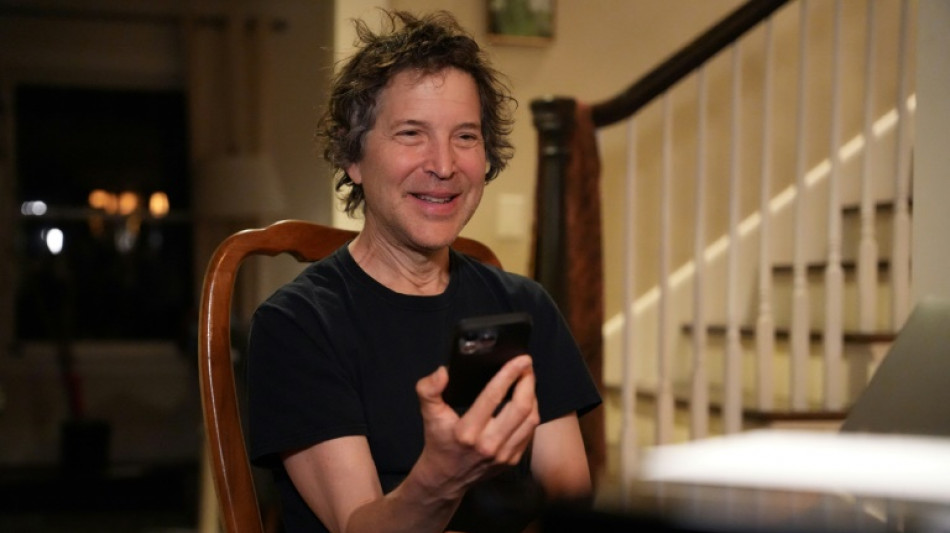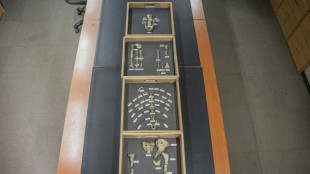
-
 Truce called after 82 killed in Pakistan sectarian clashes
Truce called after 82 killed in Pakistan sectarian clashes
-
Salah wants Liverpool to pile on misery for Man City after sinking Saints

-
 Berrettini takes Italy to brink of Davis Cup defence
Berrettini takes Italy to brink of Davis Cup defence
-
Lille condemn Sampaoli to defeat on Rennes debut

-
 Leicester sack manager Steve Cooper
Leicester sack manager Steve Cooper
-
Salah sends Liverpool eight points clear after Southampton scare

-
 Key Trump pick calls for end to escalation in Ukraine
Key Trump pick calls for end to escalation in Ukraine
-
Tuipulotu try helps Scotland end Australia's bid for a Grand Slam

-
 Davis Cup organisers hit back at critics of Nadal retirement ceremony
Davis Cup organisers hit back at critics of Nadal retirement ceremony
-
Noel in a 'league of his own' as he wins Gurgl slalom

-
 A dip or deeper decline? Guardiola seeks response to Man City slump
A dip or deeper decline? Guardiola seeks response to Man City slump
-
Germany goes nuts for viral pistachio chocolate

-
 EU urges immediate halt to Israel-Hezbollah war
EU urges immediate halt to Israel-Hezbollah war
-
Basel votes to stump up bucks to host Eurovision

-
 Ukraine shows fragments of new Russian missile after 'Oreshnik' strike
Ukraine shows fragments of new Russian missile after 'Oreshnik' strike
-
Six face trial in Paris for blackmailing Paul Pogba

-
 Olympic champion An wins China crown in style
Olympic champion An wins China crown in style
-
It's party time for Las Vegas victor Russell on 'dream weekend'

-
 Norris applauds 'deserved' champion Verstappen
Norris applauds 'deserved' champion Verstappen
-
Kohli blasts century as India declare against Australia

-
 Verstappen 'never thought' he'd win four world titles
Verstappen 'never thought' he'd win four world titles
-
Former Masters champion Reed wins Hong Kong Open

-
 Awesome foursomes: Formula One's exclusive club of four-time world champions
Awesome foursomes: Formula One's exclusive club of four-time world champions
-
Smylie beats 'idol' Cameron Smith to win Australian PGA Championship

-
 Five key races in Max Verstappen's 2024 title season
Five key races in Max Verstappen's 2024 title season
-
Max Verstappen: Young, gifted and single-minded four-time F1 champion

-
 'Star is born': From homeless to Test hero for India's Jaiswal
'Star is born': From homeless to Test hero for India's Jaiswal
-
Verstappen wins fourth consecutive Formula One world title

-
 Survivors, sniffing dogs join anti-mine march at Cambodia's Angkor Wat
Survivors, sniffing dogs join anti-mine march at Cambodia's Angkor Wat
-
Far right eye breakthrough in Romania presidential vote

-
 Jaiswal slams majestic 161 but Australia fight back in Perth
Jaiswal slams majestic 161 but Australia fight back in Perth
-
Edinburgh's alternative tour guides show 'more real' side of city

-
 IPL teams set to splash the cash at 'mega-auction' in Saudi Arabia
IPL teams set to splash the cash at 'mega-auction' in Saudi Arabia
-
Olympics in India a 'dream' facing many hurdles

-
 Wounded Bangladesh protesters receive robotic helping hand
Wounded Bangladesh protesters receive robotic helping hand
-
Majestic Jaiswal 141 not out as India pile pain on Australia

-
 Giannis, Lillard lead Bucks over Hornets as Spurs beat Warriors
Giannis, Lillard lead Bucks over Hornets as Spurs beat Warriors
-
Juan Mata agent slammed as 'cowardly' by angry A-League coach

-
 Marta inspires Orlando Pride to NWSL title
Marta inspires Orlando Pride to NWSL title
-
Palestinian pottery sees revival in war-ravaged Gaza

-
 Main points of the $300 billion climate deal
Main points of the $300 billion climate deal
-
Robertson wants policy change for overseas-based All Blacks

-
 Israel retreat helps rescuers heal from October 7 attack
Israel retreat helps rescuers heal from October 7 attack
-
Afghan women turn to entrepreneurship under Taliban

-
 Mounting economic costs of India's killer smog
Mounting economic costs of India's killer smog
-
At climate talks, painstaking diplomacy and then anger

-
 Uruguayans head to polls with left hoping for comeback
Uruguayans head to polls with left hoping for comeback
-
Trump's mass deportation plan could end up hurting economic growth

-
 Iran director in exile says 'bittersweet' to rep Germany at Oscars
Iran director in exile says 'bittersweet' to rep Germany at Oscars
-
US consumers to bargain hunt in annual 'Black Friday' spree


Nobel chemistry winner sees engineered proteins solving tough problems
Whether it's battling tumors or breaking down plastic, American scientist David Baker, co-recipient of this year's Nobel Prize in Chemistry, has an answer: engineering proteins that don't naturally exist -- a concept once dismissed as "crazy."
Today, proteins with novel functions are flowing steadily out of his lab, with an endless list of potential applications ranging from ultra-targeted therapies to the development of new vaccines.
"Across the range of problems that we face today in medicine and health, sustainability, energy, and technology, I think the potential for protein design is enormous," Baker told AFP via video call from Seattle, hours after learning of his Nobel win alongside two other laureates.
Proteins are organic molecules that play a fundamental role in almost every function of living organisms, from muscle contraction and food digestion to neuron activation and more.
"The ones in nature evolved to solve all the problems that were faced during natural selection," explained the 62-year-old University of Washington professor.
"But humans face new problems today," added the biochemist and computational biologist.
"We're heating up the planet, so we need new solutions in ecology and sustainability. We live longer, so there's new diseases which are relevant, like Alzheimer's disease. There's new pathogens like coronavirus."
Rather than leave these problems up to evolution -- a "brutal" solution that would take a very, very long time -- "with new proteins, we can solve those problems, but in a very short time," he said.
- From fringe to mainstream -
All proteins are composed of chains of amino acids, whose sequence dictates their shape -- and ultimately their function.
For decades, scientists have tried to determine protein structures based on these amino acid sequences.
In the late 1990s, Baker made strides towards solving this problem with a computer software he developed called Rosetta.
His success prompted a shift his focus to the reverse approach: starting with a desired shape and using Rosetta to identify the corresponding amino acid sequence. This sequence can then be introduced into bacteria, which synthesize the new protein that can be harvested and studied.
In 2003, he published his breakthrough finding -- the creation of the first-ever protein not found in nature -- though it still lacked a defined function.
"Then we started trying to design proteins that actually would do useful things," Baker recalled. "And that's when people, I think, really started thinking it was crazy."
But "for the last 20 years -— and really, most recently, the last five years -— we've been able to make proteins that do all kinds of amazing things," he said. Rosetta meanwhile has been progressively improved to incorporate artificial intelligence.
"I think what's kind of funny now is that the lunatic fringe, which pretty much no one was doing, has now entered the mainstream," he added with a laugh.
- Keys that fit locks -
How do scientists decide what shape a new protein needs to achieve the desired function?
Baker gives the example of a tumor. "We know some protein that's on the surface of that tumor, and we know its shape. What we do is we design a protein that acts like a key fitting into a lock," he explained.
Another application: breaking down plastic. In this case, a protein is designed to attach itself to the plastic molecule, accompanied by chemical compounds to "cut" it.
In medicine, this technology has already been used in a Covid-19 vaccine approved in South Korea. Researchers are also exploring its potential to create new materials.
"In biology, we have tooth and bone, we have shells, which are made by proteins interacting with inorganic compounds like calcium carbonate or calcium phosphate," says Baker, envisioning proteins interacting with other compounds to create entirely new materials with unique properties.
Greenhouse gas capture, a universal flu vaccine, improved antivenom -- Baker's wish list goes on and on.
"As protein design becomes more powerful, I'm incredibly excited about all the problems that we will be able to solve."
V.Dantas--PC



